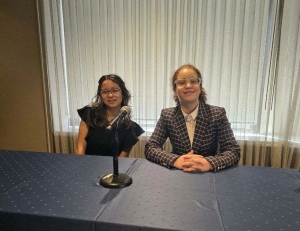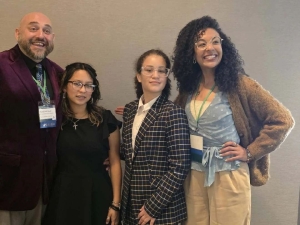
Advance CTE has long been committed to amplifying learner voice to improve Career Technical Education (CTE) programs, policies, and learner outcomes. Through the Leveraging Learner Voice to Strengthen CTE initiative and the Amplifying Learner Voice to Improve CTE technical assistance cohorts, Advance CTE has 50-state support, including intensive technical assistance to states to embed learner voice in CTE program improvement. Delaware is a leader in building sustainable processes in CTE and beyond through active learner engagement, sustainable practices, and dedication to increasing access. This ensures that learners play a central role in shaping their educational experiences.

As part of this commitment, Delaware recently traveled to Washington, DC, with two learners in tow to share their experiences on a national stage. Lani, a first-year undergraduate student, and Kylie, a high school junior, joined leaders nationwide to discuss how engaging learners as active thought and collaborative partners can strengthen CTE systems. Their insights offered powerful reminders about authentic learner engagement in practice.

During the hour-long panel, Lani and Kylie stressed the importance of reaching out to learners, creating safe spaces to share feedback, and valuing their lived experiences as key inputs for improving CTE programs. Among the many insights they shared, three key themes resonated most deeply with leaders in attendance:
“All You Have to Do Is TRY.”
Lani encouraged leaders to take the first step in engaging learners as partners, emphasizing that learners don’t expect perfection—they just want to see adults put forth genuine effort. Too often, learners are brought into conversations after key decisions have been made. Authentic learner engagement requires viewing learners not as afterthoughts but as active leaders and partners in strengthening CTE programs. By trying to engage learners early and often, leaders demonstrate respect for learners’ ideas, experiences, and contributions.
“Make Learners Feel Safe.”
Kylie reminded leaders that even when learners are invited into spaces to share their insights, fear and anxiety can still be significant barriers. Learners may feel intimidated by the presence of adults in positions of power, which can prevent them from sharing candid feedback. Kylie emphasized that leaders should intentionally build trusted relationships with learners to create safe environments for engagement. When this isn’t possible, learners urged leaders to leverage trusted adults—like a beloved teacher or advisor—to facilitate those conversations and ensure learners feel secure as they engage in leadership to improve CTE.
“Lean into Humility.”
Lani and Kylie also underscored that engaging learners as partners requires humility. Learner voice initiatives often reveal uncomfortable truths about existing programs or policies. Leaders are encouraged to approach this process with a mindset of growth—listening openly, learning alongside learners, and being willing to make changes based on their insights. Embracing this mindset allows leaders to strengthen partnerships with learners and ensure continuous improvement in CTE.
Recommendations for CTE Leaders
To take meaningful steps toward strengthening learner engagement in CTE, leaders can:
- Review Advance CTE’s Resources: Advance CTE has developed numerous tools and resources to support states embedding learner voice in CTE systems. Exploring these resources can provide actionable strategies for engaging learners authentically and effectively.
- Reflect on Your System: Leaders should assess existing structures to identify opportunities for learners to contribute their insights. This may involve evaluating advisory boards, program design processes, or professional development efforts to ensure learner voice is integrated meaningfully.
- Start Where You Are: Meaningful engagement doesn’t require a complete system overhaul. Leaders are encouraged to identify small but impactful ways to engage learners. This could include inviting learners to provide input on program materials, participate in local advisory meetings, or co-facilitate professional development sessions for educators.
By taking these steps, CTE leaders can create meaningful opportunities for learners to shape the policies, programs, and experiences that directly impact their education and career journeys. Delaware’s leadership in this space demonstrates that when learners are empowered as partners, CTE systems are strengthened in ways that better serve all students.

